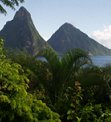 The country of Saint Lucia, in the Caribbean, is one of the Windward Islands, part of the Antilles (Lesser) island chain.
The country of Saint Lucia, in the Caribbean, is one of the Windward Islands, part of the Antilles (Lesser) island chain.
Archaeological sites show that Amerindian people, from Venezuela, were early inhabitants of the island.
Castries in the north-west of the island was founded by the French in 1650. The capital city and a port, Castries has a lively market selling agricultural produce and local crafts.
The town of Soufriere on the south-west coast was originally part of the two thousand acre Soufriere Estate granted to the Devaux family by King Louis XIV in 1713. Today, Soufriere depends on tourism and agriculture.
Near the town of Soufriere, the Pitons, two cone shaped volcanic mountains rise from the sea. The Pitons Management Area, designated a World Heritage Site in 2004, includes a Marine Reserve.
The bay of Anse Mamin, south of Soufriere and part of the Anse Chastenet six hundred acre estate, leads to a former sugar plantation. Here, amongst the luxuriant growth of trees and plants, are the remnants of plantation buildings, a small church and the burial ground of West African slaves.

Trees include banana, cocoa, coconut, mango and soursop. Herbs grow in abundance and have been used, together with other plants such as the mimosa and aloe vera, to create medicines for generations.
The Jacquot Parrot is the national bird. Other birds found in St Lucia are the Brown Booby, Bananaquits, Caribbean Martins, Lesser Antillean Bullfinches and the Purple-throated Carib (hummingbird). Wildlife includes tree frogs and lizards.
Tourism takes advantage of all St Lucia's natural and cultural assets. The aim is to contribute to the
economy and thus benefit the host communities and St Lucians generally. Many people work in the tourist industry and associated sectors such as agriculture and fishing.
A number of overseas companies are investors in tourism and other industries in St Lucia. Some of these are based in Canada, the USA, Venezuela, the UK, EU countries, Hong Kong and the Republic of Korea.
Tourists who visit St Lucia often see the country as an island paradise. However, the Nobel speech by St Lucia's most well known poet gives people food for thought:
"The Caribbean is not an idyll, not to its natives. They draw their working strength from it organically, like trees, like the sea almond or the spice laurel of the heights. Its peasantry and its fishermen are not there to be loved or even photographed; they are trees who sweat, and whose bark is filmed with salt" ... Derek Walcott 1992
Read the WIZ information on ST LUCIA
HURRICANE ALLEN, 1980
Page Two

